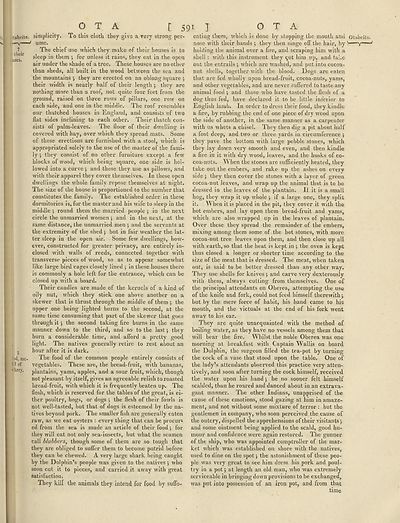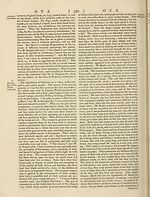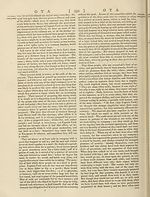Encyclopaedia Britannica > Volume 15, NIC-PAR
(667) Page 591
Download files
Complete book:
Individual page:
Thumbnail gallery: Grid view | List view

OTA
[ 59' I
OTA
taheite. simplicity. To this cloth they give a very strong per-
ume.
The chief use which they make of their houses is to
sleep in them ; for unless it rains, they eat in the open
air under the shade of a tree. These houses are no other
than sheds, all built in the wood between the sea and
the mountains 5 they ai'e erected on an oblong square ;
their width is nearly half of their length 5 they are
nothing more than a roof, not quite four feet from the
ground, raised on three rows of pillars, one row on
each side, and one in the middle. The roof resembles
our thatched houses in England, and consists of two
flat sides inclining to each other. Their thatch con¬
sists of palm-leaves. The floor of their dwelling is
covered with hay, over which they spread mats. Some
of these erections are furnished with a stool, which is
appropriated solely to the use of the master of the fami¬
ly ; they consist of no other furniture except a few
blocks of wood, which being square, one side is hol¬
lowed into a curve •, and these they use as pillows, and
with their apparel they cover themselves. In these open
dwellings the whole family repose themselves at night.
The size of the house is proportioned to the number that
constitutes the family. The established order in these
dormitories is, for the master and his wife to sleep in the
middle ; round them the married people ; in the next
circle the unmarried women •, and in the next, at the
same distance, the unmarried men; and the servants at
the extremity of the shed j but in fair weather the lat¬
ter sleep in the open air. Some few dwellings, how¬
ever, constructed for greater privacy, are entirely in¬
closed with walls of reeds, connected together with
transverse pieces of wood, so as to appear somewhat
like large bird cages closely lined 5 in these houses there
is commonly a hole left for the entrance, which can be
closed up with a board.
Their candles are made of the kernels of a kind of
oily nut, which they stick one above another on a
skewer that is thrust through the middle of them ; the
upper one being lighted burns to the second, at the
same time consuming that part of the skewer that goes
through it ; the second taking fire burns in the same
manner down to the third, and so to the last; they
burn a considerable time, and afford a pretty good
light. The natives generally retire to rest about an
hour after it is dark.
The food of the common people entirely consists of
vegetables. These are, the bread-fruit, with bananas,
plantains, yams, apples, and a sour fruit, which, though
not pleasant by itself, gives an agreeable relish to roasted
bread-fruit, with which it is frequently beaten up. The
flesh, which is reserved for the tables of the great, is ei¬
ther poultry, hogs, or dogs *, the flesh of their fowls is
not well-tasted, but that of dogs is esteemed by the na¬
tives beyond pork. The smaller fish are generally eaten
raw, as we eat oysters : every thing that can be proem*-
ed from the sea is made an article of their food j for
they will eat not only sea-insects, but what the seamen
call blubbers, though some of them are so tough that
they are obliged to suffer them to become putrid before
they can be chewed. A very large shark being caught
by the Dolphin’s people was given to the natives ; who
soon cut it to pieces, and carried it away with great
satisfaction.
They kill the animals they intend for food by suffo-
8
>d, me-
i of
isery.
eating them, 'which is done by stopping the mouth and Otaheite
nose with their hands 5 they then singe off the hair, by -y”—
holding the animal over a fire, and scraping him with a
shell : with this instrument they qut him up, and take
out the entrails } which are washed, and put into cocoa-
nut shells, together with the blood. Dogs are eaten
that are fed wholly upon bread-fruit, cocoa-nuts, yams,
and other vegetables, and are never suffered to taste any
animal food *, and those who have tasted the flesh of a
dog thus fed, have declared it to be little inferior to
English lamb. In order to dress their food, they kindle
a fire, by rubbing the end of one piece of dry wood upon
the side of another, in the same manner as a carpenter
with us whets a chisel. They then dig a pit about half
a foot deep, and two or three yards in circumference }
they pave the bottom with large pebble stones, which
they lay down very smooth and even, and then kindle
a fire in it with dry w ood, leaves, and the husks of co¬
coa-nuts. When the stones are sufficiently heated, they
take out the embers, and rake up the ashes on every
side; they then cover the stones with a layer of green
cocoa-nut leaves, and wrap up the animal that is to be
dressed in the leaves of the plantain. If it is a small
hog, they wrrap it up whole $ if a large one, they split
it. W hen it is placed in the pit, they cover it with the
hot embers, and lay upon them bread-fruit and yams,
which are also wrapped up in the leaves of plantain.
Over these they spread the remainder of the embers,
mixing among them some of the hot stones, with more
cocoa-nut tree leaves upon them, and then close up all
with earth, so that the beat is kept in ; the oven is kept
thus closed a longer or shorter time according to the
size of the meat that is dressed. The meat, when taken
out, is said to be better dressed than any other wray.
They use shells for knives; and carve very dexterously
with them, always cutting from themselves. One of
the principal attendants on Oberea, attempting the use
of the knife and fork, could not feed himself therewith j
but by the mere force of habit, his hand came to his
mouth, and the victuals at the end of his fork went
away to his ear.
They are quite unacquainted with the method of
boiling water, as they have no vessels among them that
will bear the fire. Whilst the noble Oberea was one
morning at breakfast with Captain Wallis on board
the Dolphin, the surgeon filled the tea-pot by turning
the cock of a vase that stood upon the table. One of
the lady’s attendants observed this practice very atten¬
tively, and soon after turning the cock himself, received
the water upon his hand 5 he no sooner felt himself
scalded, than he roared and danced about in an extrava¬
gant manner. The other Indians, unapprised of the
cause of these emotions, stood gazing at him in amaze¬
ment, and not without some mixture of terror : but the
gentlemen in company, who soon perceived the cause of
the outcry, dispelled the apprehensions of their visitants j
and some ointment being applied to the scald, good hu¬
mour and confidence were again restored. The gunner
of the ship, who was appointed comptroller of the mar¬
ket which was established on shore with the natives,
used to dine on the spot; the astonishment of these peo¬
ple was very great to see him dress his pork and poul¬
try in a pot; at length an old man, who was extremely
serviceable in bringing down provisions to be exchanged,
was put into possession of an iron pot, and from that
time
[ 59' I
OTA
taheite. simplicity. To this cloth they give a very strong per-
ume.
The chief use which they make of their houses is to
sleep in them ; for unless it rains, they eat in the open
air under the shade of a tree. These houses are no other
than sheds, all built in the wood between the sea and
the mountains 5 they ai'e erected on an oblong square ;
their width is nearly half of their length 5 they are
nothing more than a roof, not quite four feet from the
ground, raised on three rows of pillars, one row on
each side, and one in the middle. The roof resembles
our thatched houses in England, and consists of two
flat sides inclining to each other. Their thatch con¬
sists of palm-leaves. The floor of their dwelling is
covered with hay, over which they spread mats. Some
of these erections are furnished with a stool, which is
appropriated solely to the use of the master of the fami¬
ly ; they consist of no other furniture except a few
blocks of wood, which being square, one side is hol¬
lowed into a curve •, and these they use as pillows, and
with their apparel they cover themselves. In these open
dwellings the whole family repose themselves at night.
The size of the house is proportioned to the number that
constitutes the family. The established order in these
dormitories is, for the master and his wife to sleep in the
middle ; round them the married people ; in the next
circle the unmarried women •, and in the next, at the
same distance, the unmarried men; and the servants at
the extremity of the shed j but in fair weather the lat¬
ter sleep in the open air. Some few dwellings, how¬
ever, constructed for greater privacy, are entirely in¬
closed with walls of reeds, connected together with
transverse pieces of wood, so as to appear somewhat
like large bird cages closely lined 5 in these houses there
is commonly a hole left for the entrance, which can be
closed up with a board.
Their candles are made of the kernels of a kind of
oily nut, which they stick one above another on a
skewer that is thrust through the middle of them ; the
upper one being lighted burns to the second, at the
same time consuming that part of the skewer that goes
through it ; the second taking fire burns in the same
manner down to the third, and so to the last; they
burn a considerable time, and afford a pretty good
light. The natives generally retire to rest about an
hour after it is dark.
The food of the common people entirely consists of
vegetables. These are, the bread-fruit, with bananas,
plantains, yams, apples, and a sour fruit, which, though
not pleasant by itself, gives an agreeable relish to roasted
bread-fruit, with which it is frequently beaten up. The
flesh, which is reserved for the tables of the great, is ei¬
ther poultry, hogs, or dogs *, the flesh of their fowls is
not well-tasted, but that of dogs is esteemed by the na¬
tives beyond pork. The smaller fish are generally eaten
raw, as we eat oysters : every thing that can be proem*-
ed from the sea is made an article of their food j for
they will eat not only sea-insects, but what the seamen
call blubbers, though some of them are so tough that
they are obliged to suffer them to become putrid before
they can be chewed. A very large shark being caught
by the Dolphin’s people was given to the natives ; who
soon cut it to pieces, and carried it away with great
satisfaction.
They kill the animals they intend for food by suffo-
8
>d, me-
i of
isery.
eating them, 'which is done by stopping the mouth and Otaheite
nose with their hands 5 they then singe off the hair, by -y”—
holding the animal over a fire, and scraping him with a
shell : with this instrument they qut him up, and take
out the entrails } which are washed, and put into cocoa-
nut shells, together with the blood. Dogs are eaten
that are fed wholly upon bread-fruit, cocoa-nuts, yams,
and other vegetables, and are never suffered to taste any
animal food *, and those who have tasted the flesh of a
dog thus fed, have declared it to be little inferior to
English lamb. In order to dress their food, they kindle
a fire, by rubbing the end of one piece of dry wood upon
the side of another, in the same manner as a carpenter
with us whets a chisel. They then dig a pit about half
a foot deep, and two or three yards in circumference }
they pave the bottom with large pebble stones, which
they lay down very smooth and even, and then kindle
a fire in it with dry w ood, leaves, and the husks of co¬
coa-nuts. When the stones are sufficiently heated, they
take out the embers, and rake up the ashes on every
side; they then cover the stones with a layer of green
cocoa-nut leaves, and wrap up the animal that is to be
dressed in the leaves of the plantain. If it is a small
hog, they wrrap it up whole $ if a large one, they split
it. W hen it is placed in the pit, they cover it with the
hot embers, and lay upon them bread-fruit and yams,
which are also wrapped up in the leaves of plantain.
Over these they spread the remainder of the embers,
mixing among them some of the hot stones, with more
cocoa-nut tree leaves upon them, and then close up all
with earth, so that the beat is kept in ; the oven is kept
thus closed a longer or shorter time according to the
size of the meat that is dressed. The meat, when taken
out, is said to be better dressed than any other wray.
They use shells for knives; and carve very dexterously
with them, always cutting from themselves. One of
the principal attendants on Oberea, attempting the use
of the knife and fork, could not feed himself therewith j
but by the mere force of habit, his hand came to his
mouth, and the victuals at the end of his fork went
away to his ear.
They are quite unacquainted with the method of
boiling water, as they have no vessels among them that
will bear the fire. Whilst the noble Oberea was one
morning at breakfast with Captain Wallis on board
the Dolphin, the surgeon filled the tea-pot by turning
the cock of a vase that stood upon the table. One of
the lady’s attendants observed this practice very atten¬
tively, and soon after turning the cock himself, received
the water upon his hand 5 he no sooner felt himself
scalded, than he roared and danced about in an extrava¬
gant manner. The other Indians, unapprised of the
cause of these emotions, stood gazing at him in amaze¬
ment, and not without some mixture of terror : but the
gentlemen in company, who soon perceived the cause of
the outcry, dispelled the apprehensions of their visitants j
and some ointment being applied to the scald, good hu¬
mour and confidence were again restored. The gunner
of the ship, who was appointed comptroller of the mar¬
ket which was established on shore with the natives,
used to dine on the spot; the astonishment of these peo¬
ple was very great to see him dress his pork and poul¬
try in a pot; at length an old man, who was extremely
serviceable in bringing down provisions to be exchanged,
was put into possession of an iron pot, and from that
time
Set display mode to:
![]() Universal Viewer |
Universal Viewer | ![]() Mirador |
Large image | Transcription
Mirador |
Large image | Transcription
Images and transcriptions on this page, including medium image downloads, may be used under the Creative Commons Attribution 4.0 International Licence unless otherwise stated. ![]()
| Encyclopaedia Britannica > Encyclopaedia Britannica > Volume 15, NIC-PAR > (667) Page 591 |
|---|
| Permanent URL | https://digital.nls.uk/192590369 |
|---|
| Attribution and copyright: |
|
|---|
| Shelfmark | EB.11 |
|---|---|
| Description | Ten editions of 'Encyclopaedia Britannica', issued from 1768-1903, in 231 volumes. Originally issued in 100 weekly parts (3 volumes) between 1768 and 1771 by publishers: Colin Macfarquhar and Andrew Bell (Edinburgh); editor: William Smellie: engraver: Andrew Bell. Expanded editions in the 19th century featured more volumes and contributions from leading experts in their fields. Managed and published in Edinburgh up to the 9th edition (25 volumes, from 1875-1889); the 10th edition (1902-1903) re-issued the 9th edition, with 11 supplementary volumes. |
|---|---|
| Additional NLS resources: |
|

